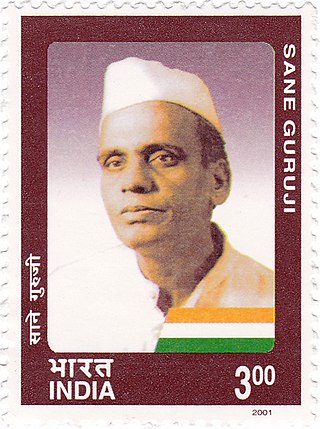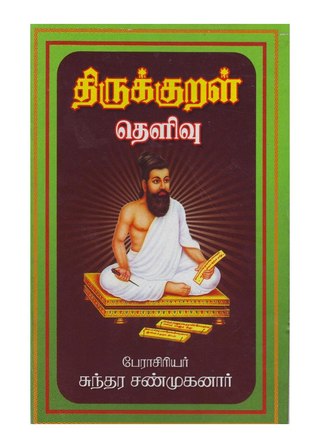| Part of a series on |
| Translation |
|---|
 |
| Types |
| Theory |
| Technologies |
| Localization |
| Institutional |
| Related topics |
|
As of 2023, Marathi has at least three translation available of the Tirukkural, of which two are complete.
| Part of a series on |
| Translation |
|---|
 |
| Types |
| Theory |
| Technologies |
| Localization |
| Institutional |
| Related topics |
|
As of 2023, Marathi has at least three translation available of the Tirukkural, of which two are complete.

The Kural text was translated into Marathi by the Marathi author Pandurang Sadashiv Sane, widely known as Sane Guruji, in 1930. [1] He made the translation while undergoing imprisonment as a political prisoner in the Tiruchirapalli jail. [2] At the prison, he started learning Tamil and studied the Kural and was tempted to translate the work into Marathi. [1] He referred to the works on the Kural by V. V. S. Aiyar [2] [3] and also consulted with fellow Tamil inmates at the prison to get the full import of subtle ideas in the work. [3] Although completed by 1930, only an unofficial print appeared on 17 December 1930 as Sane Guruji was still serving his prison sentence. [3] When he was released from prison in 1948, Sane Guruji started his own press named "Sadhana Prakashan" and the translation was officially published on 28 September 1948 [1] [4] [5] under the title Kural: Theen Purushartha. The second edition was published in 1960. [6] Reprints appeared in 1960 and 1975, by Continental Prakashan, [4] and again in 1987. [6] The Marathi translation by Sane Guruji is a complete translation. [1]
In the meantime, Narayana Govindarao Peshwe and Ganpath Govindarao Peshwe, a lawyer duo from Thulajapur, translated a Hindi translation of the Kural text by Kshemananda into Marathi and published it in the journal Lokamitra from July 1929 to June 1930. However, they translated only the first 89 chapters of the Kural literature because the Hindi translation itself was incomplete and did not contain Book III of the Kural. In May 1930, this translation was published as a book by T. K. Sadekar from his publishing house named Dhananjay Press in Belgaum, Karnataka. [4] Although the said Hindi translation was based on V. V. S. Aiyar's English translation, which Kshemananda claimed that the translation was cross-checked against the Tamil original by a Tamil scholar before publication, the Marathi translation by Peshwe brothers was not cross-checked against the Kural's original version in Tamil. [4] Both Sane Guruji and Peshwe Brothers' translations were in prose. [7]
Although many scholars before him refrained from translating the third book of the Kural (Book of Love), Sane Guruji translated the whole work. In his work, he described about his decision to do so, thus:
The translation of this book is available in Hindi with the name of 'Tamil Veda, but it includes only two sections: 'Dharma' (Arattuppal) and 'Artha' (Porutpal). The third section discussing 'Kama' (Kamattuppal) has been dropped. Actually in this section there is nothing which can be said to be obscene or vulgar. It is a very fine section. I have translated that section in full. [8]
In 1977, the Maharashtra State Literature and Cultural Board published another Marathi translation done by Purushottam Dinkar Joshi, a scholar of Marathi language at Government Oriental Manuscripts Library in Chennai. It was published under the title Thiruvalluvar Virchit Tirukkural. [9]
| Translation | Chapter 26, सर्ग २६: मांसाशन नको | |
|---|---|---|
| Kural 254 (Couplet 26:4) | Kural 258 (Couplet 26:8) | |
| Pandurang Sadashiv Sane (1930) | प्राण्यांची हिंसा करणे म्हणजे खरोखर हृदयाचा निष्ठुरपणा आहे; आणि त्यांचे मांस खाणे म्गणजे तर फारच अन्याय वाटतो. | या मायामय, अज्ञानमय संसाराची बंधने सोडून जे मुक्त झाले, ते हत्या करून कधीही मांसाशन करणार नाहीत. |

Pandurang Sadashiv Sane, also known as Sane Guruji by his students and followers, was a Marathi author, teacher, social activist and freedom fighter from Maharashtra, India. His literature, aimed at educating children, continues to inspire the young and old. After Gandhi's assassination, he became very upset. He then died due to overdose of his sleeping pills.
Parimelalhagar, sometimes spelled Parimelazhagar, born Vanduvarai Perumal, was a Tamil poet and scholar known for his commentary on the Thirukkural. He was the last among the canon of ten medieval commentators of the Kural text most highly esteemed by scholars. He was also among the five oldest commentators whose commentaries had been preserved and made available to the Modern era, the others being Manakkudavar, Pari Perumal, Kaalingar, and Paridhi. Of all the ancient commentaries available of the Kural literature, Parimelalhagar's commentary is considered by scholars as the best both in textual and literary aspects. The codification of the writings of Valluvar is attributed to Parimelalhagar. Parimelalhagar also remains the most reviewed, in terms of both praise and criticism, of all the medieval Kural commentators. Praised for its literary richness and clarity, Parimelalhagar's commentary is considered highly complex and exquisite in its own right that it has several scholarly commentaries appearing over the centuries to elucidate it. Along with the Kural text, Parimelalhagar's commentary has been widely published that it is in itself regarded a Tamil classic.

The Tirukkuṟaḷ, or shortly theKural, is a classic Tamil language text consisting of 1,330 short couplets, or kurals, of seven words each. The text is divided into three books with aphoristic teachings on virtue (aram), wealth (porul) and love (inbam), respectively. Considered one of the greatest works ever written on ethics and morality, it is widely acknowledged for its universality and secular nature. Its authorship is traditionally attributed to Valluvar, also known in full as Thiruvalluvar. The text has been dated variously from 300 BCE to 5th century CE. The traditional accounts describe it as the last work of the third Sangam, but linguistic analysis suggests a later date of 450 to 500 CE and that it was composed after the Sangam period.
Tirukkural, also known as the Kural, an ancient Indian treatise on the ethics and morality of the commoner, is one of the most widely translated non-religious works in the world. Authored by the ancient Tamil poet-philosopher Thiruvalluvar, it has been translated into at least 42 world languages, with about 57 different renderings in the English language alone.

Latin is the first foreign language into which the Tirukkuṟaḷ was translated. There are three known translations of the Kural text available in Latin.
Hindi perhaps has many translations of the Tirukkural. As of 2000, there were at least 19 translations of the Kural text available in Hindi. Many of these translations are in verse form.
Kannada has at least eight translations of the Tirukkural available as of 2014. Both prose and verse translations have been made in Kannada.
French has the second maximum number of translations of the Tirukkural among European languages, next only to English. As of 2015, there were at least 18 translations of the Kural text available in French.
Malayalam has seen the most number of Tirukkural translations than that of any other language in India. As of 2007, there are at least 21 translations of the Kural text available in Malayalam. Malayalam also has the distinction of producing the first ever translation of the Kural text among the languages in India and the world at large. The Annual Report of the Cochin Archeological Department for the year 1933–34 reported an unpublished manuscript of a Malayalam translation of the Tirukkural made in 1595.
Telugu is one of the Indian languages that has had the earliest Tirukkural translations in modern times. As of 2000, there were at least 14 translations of the Kural text available in Telugu.
As of 2015, there were at least three Gujarati translations available of the Tirukkural.
As of 2015, there were at least five Sanskrit translations available of the Tirukkural.
As of 2015, Fijian had at least two translations available of the Tirukkural.
Manakkudavar was a Tamil scholar and commentator known for his commentary on the Tirukkural. His is the earliest of the available commentaries on the Kural text, and hence considered to bear closest semblance with the original work by Valluvar. He was among the canon of Ten Medieval Commentators of the Kural text most highly esteemed by scholars. He was also among the five ancient commentators whose commentaries had been preserved and made available to the Modern era, the others being Pari Perumal, Kaalingar, Paridhi, and Parimelalhagar.
The Ten Medieval Commentators were a canonical group of Tamil scholars whose commentaries on the ancient Indian didactic work of the Kural are esteemed by later scholars as worthy of critical analysis. These scholars lived in the Medieval era between the 10th and 13th centuries CE. Among these medieval commentaries, the commentaries of Manakkudavar, Kaalingar, and Parimelalhagar are considered pioneer by modern scholars.

P. C. Kokila is an Indian professor of Hindi, who is best known for translating the Tirukkural into Gujarati.
The Book of Inbam, in full Iṉbattuppāl, or in a more sanskritized term Kāmattuppāl, also known as the Book of Love, the Third Book or Book Three in translated versions, is the third of the three books or parts of the Kural literature, authored by the ancient Indian philosopher Valluvar. Written in High Tamil distich form, it has 25 chapters each containing 10 kurals or couplets, making a total of 250 couplets all dealing with human love. The term inbam or kamam, which means 'pleasure', correlates with the third of the four ancient Indian values of dharma, artha, kama and moksha. However, unlike Kamasutra, which deals with different methods of lovemaking, the Book of Inbam expounds the virtues and emotions involved in conjugal love between a man and a woman, or virtues of an individual within the walls of intimacy, keeping aṟam or dharma as the base.
The dating of the Tirukkural, and by extension the period of its author Valluvar, has been a subject of intense debate among scholars for centuries, and it continues to remain so. The Kural is variously dated between 300 BCE and 5th century CE. According to Blackburn, the "current scholarly consensus" dates the text and the author to approximately 500 CE. The Tamil Nadu government has ratified 31 BCE as the year of birth of Valluvar. Still the precise date as to when Valluvar completed writing the Kural text remains murky. This article speaks about various dates arrived at by various scholars over time.
Tirutthanigai Saravanaperumal Aiyar was a Tamil scholar, best known for his commentary on the Tirukkural and other Tamil classics.
Jagavira Pandiyanar, commonly known as Kaviraja Pandithar, was a 20th-century Indian scholar of the Tamil language, who is known for his commentary on the Tirukkural.